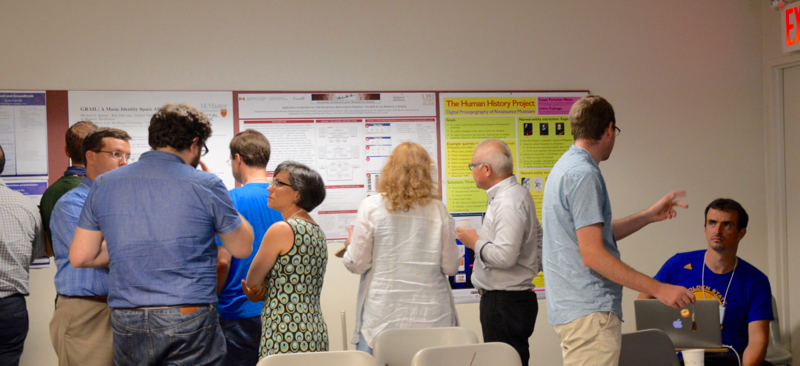Digital Libraries for Musicology 2016 Report
Digital Libraries for Musicology 2016 Report
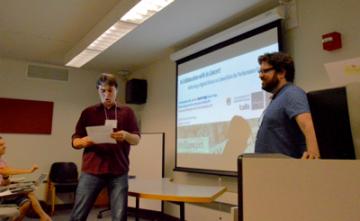
The Digital Libraries for Musicology (DLfM) workshop was started in 2014 by Kevin Page and Ben Fields. It provides a place to talk about digital library systems specialised for musical and musicological materials. It has run for three years now, with procedings published by the Association of Computing Machinery's International Conference Proceedings Series (ACM-ICPS).
This year, DLfM was organised as a satellite event of the International Society for Music Information Retrieval Conference in New York, and hosted by the Bobst Library of NYU. With over 50 people in attendance, it was the best-attended DLfM so far. And, with 11 paper presentations, 4 posters and a round-table discussion, the programme was full and varied, in terms of the musical materials discussed, the techniques used and the problems they addressed.
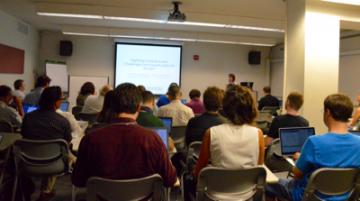
Questions of how to annotate and study performance and recordings were considered in the general sense by Johanna Devany (coauthoring with Hubert Léveillé Gauvin) and in the specific case of performance parameters for recordings of a single opera by Joshua Neumann. The places and personnel of performance are also important areas of study, and an exciting database of information about Jazz sessions was described and analysed by Yun Hao, Kahyun Choi and Stephen Downie, whilst work by our mini-project on publishing information about historical concerts from the In Cocert database was presented by David Weigl.
Moving from performances to performance annotations, a paper by Eamonn Bell and Laurent Pugin discussed approaches to recognising conductors’ markings in scores, whilst the question of how libraries and librarians respond to the challenges of digitisation formed the basis of Audrey Laplante and Ichiro Fujinaga’s contribute. Automated transcription of scores (OMR) was demonstrated in ground-breaking work by Jorge Calvo-Zaragoza, Gabriel Vigliensoni and Ichiro Fujinaga, whose deep-learning system shows potential to take the field forward dramatically, while Fu-Hai Frank Wu provided a useful reminder that there are other notations for which OMR is valuable, exemplified by Chinese numerical notations.
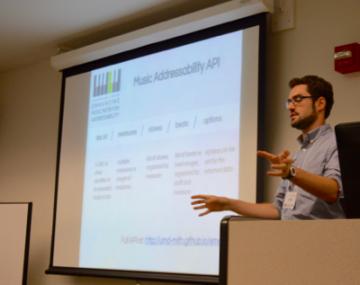
For musical analysis, Altuğ Karakurt presented impressively work co-authored with Sertan Şentürk and Xavier Serra, demonstrating a general-purpose mode recognition tool for audio by applying it to Ottoman-Turkish Makam music. On a more formal level, David Rizo and Alan Marsden found areas of commonality in hierarchical music analysis that would permit a common format for communicating them.
Musicology and digital libraries are also very much concerned with historical, social and contextual information around music and musical activity. Alastair Porter's presentation, co-authored with Dmitry Bogdanov and Xavier Serra, showed some of the great strengths and weaknesses of crowd-provided – and expert-provided – musical information, including the rare ‘brutal death metal’—‘easy listening’ hybrid that is Rick Astley’s Whenever You Need Somebody.
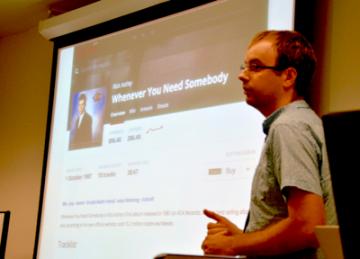
Susan Weiss and Ichiro Fujinaga's poster on their work on a digital prosopography of Renaissance musicians provided a very different sort of historical information, while Raffaele Vigliante addressed the important issue of how to point to parts of musical works from other sources of information.
The DLfM workshop is becoming a rich and popular venue for scholarship at the intersection of musicology and library science and practice, and there is strong enthusiasm for its continuation. Nonetheless, in closing the day, Kevin Page and Ben Fields noted the extent to which the organisation of the event falls on its small organisational team and asked for those interested in helping run future events and to steer the workshop in the future to contact them. This request still stands, and any interested in helping should please e-mail Kevin Page.
The proceedings from the workshop have now been published, and a special issue of the International Journal for Digital Libraries based on work from this workshop series is forthcoming. News and resources relating to the workshop can be found on a dedicated page on the Transforming Musicology website.
